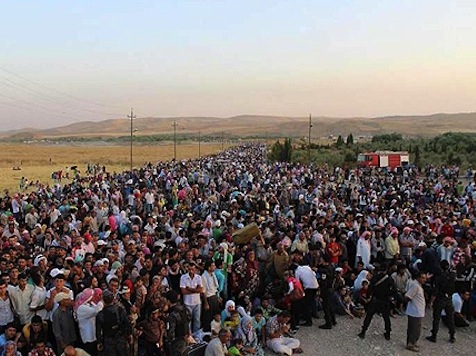Riots have erupted across Turkey and Europe in the last few nights as Kurds took to the streets to protest against ISIS’s capture of the Syrian-Turkish border town of Kobani. Just one week ago Turkish Prime Minister Recep Tayyip Erdoğan promised that the town would not fall to the Islamic fighters, yet Turkish troops stood by and watched as the town was overrun by militants and residential neighbourhoods were pounded with artillery, in a seige which has left 400 dead.
In Turkey, 14 protestors were killed, including one who was shot dead by police, whilst in Germany police managed to split up hundreds of Kurds and Salafists warring on the streets of Hamburg, in brawls which left 14 injured.
Yesterday President Erdoğan visited the nearby town of Gaziantep, on the Turkish side of the border, to announce that Kobani was “on the verge of falling”, even as ISIS’ artillery continued to fall on residential neighbourhoods. The US-led coalition has taken to carrying out bombing raids in daylight in an attempt to hold back the tide, but although the attack has been slowed, the action has failed to break the three-week siege, the Times has reported.
Erdoğan lay blame for the failure to hold the town at the feet of Nato, saying that Turkish involvement was dependent on coalition support for the creation of a safe zone in northern Syria. “We asked for three things: for a no-fly zone to be created; for a secure zone parallel to the region to be declared; and for the moderate opposition in Syria and Iraq to be trained and equipped,” he said. The US has already rejected the requests.
His position has sparked fury from the country’s 15 million Kurds, many of whom took to the streets of Ankara, Istanbul, and south eastern cities to protest. Police responded with rubber bullets, water cannon and tear gas. There are also reports that in the town of Varto police opened fire with live rounds, shooting dead a 25 year old man.
Thousands more Turkish Kurds have travelled to the border to watch the fight for Kobani unfold. There, police have again used tear gas and water cannon to hold the crowds back.
Nazmi Gur, is a Member of Parliament for the pro-Kurdish People’s Democratic Party, whose fighters, known as the YPG, are helping to defend Kobani. “The protests will grow,” he predicted. His party is calling for the creation of a corridor to allow heavy weapons to reach the town, but so far the Turkish government has refused to take action.
“If Turkey is really a part of this coalition, they have to open this corridor and allow immediate weapons and support for the people of Kobani,” he said.
The situation has also led to widespread protests by Kurdish communities across Europe.
Around 800 Kurds and Muslims clashed on the streets of Hamburg last night, leaving 14 injured. Metal bars, machetes and other makeshift weapons were brought to the fight, which the police struggled to contain. It was eventually brought to an end when police deployed water cannon against both groups.
The 400 Kurds had taken part in a demonstration against ISIS earlier in the day, and were congregating around the Al-Nour mosque in the St Georg area of Hamburg, when they were approached by a group of around 400 Muslims, who police say were probably Salafists, according to The Local.
Fighting broke out between the two groups at around 11pm, with the police acting to contain it by placing vehicles between the warring tribes and blocking off all roads to the mosque. Sometime after midnight police turned water cannon on the brawlers to split the groups apart. Police intervention lasted until the early hours of this morning, by which time 22 people had been arrested and 14 injured.
The Kurdish protest earlier in the day had passed peacefully, with around 500 turning out to show solidarity with their fellow Kurds in Kobani. At 6pm, 80 people blocked train platforms in the Hamburg Central Station as part of the protest.
The brawls follow a similar clash between 30 Muslims and 60 Yazidis in Calle, Germany on Monday night. The two groups set about each other with fists and objects to hand used as weapons before the 50 police officers deployed to the scene separated them.
Although no arrests were made at the scene, police are investigating incidents of grievous bodily harm and serious breach of the peace. Six were injured in the fight.
And at the European Parliament, 150 Kurdish protestors broke through security yesterday to storm through the Parliamentary building, where they chanted slogans and waved yellow flags featuring the image of their jailed separatist leader Abdullah Ocalan. There they staged a sit in until Members of the European Parliament agreed to meet with them. Martin Shultz, president of the parliament, is reported to have told the group that he shared their concerns, promised to convey their message to Nato, and asked them to leave peacefully, which they did.

COMMENTS
Please let us know if you're having issues with commenting.